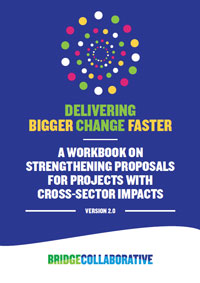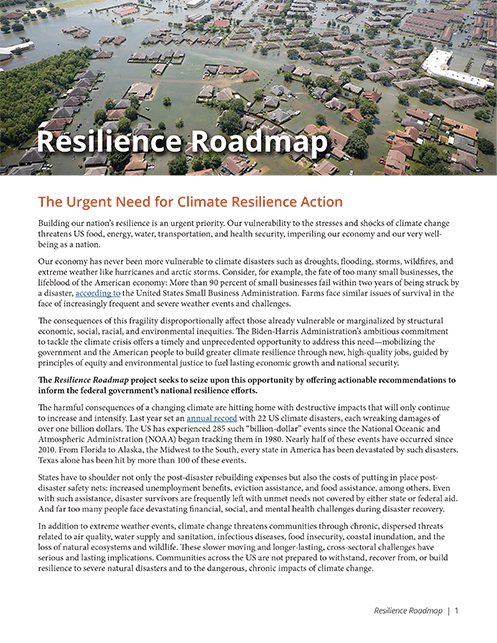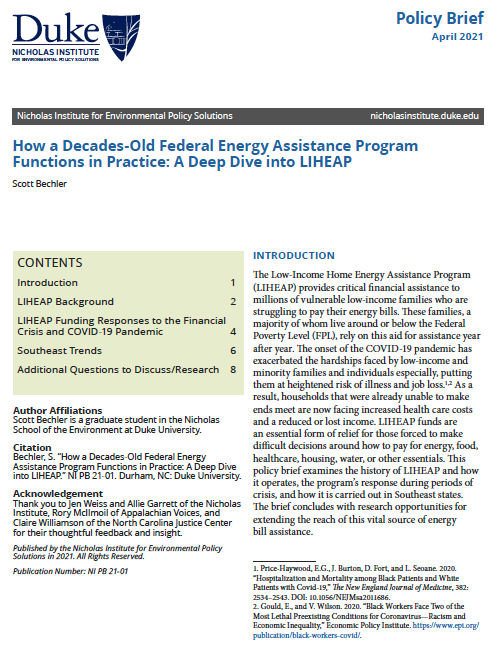Publications
Delivering Bigger Change Faster
While we know that cross-sector thinking is essential, it is not commonplace. Delivering Bigger Change Faster: A Workbook on Strengthening Proposals for Projects With Cross-sector Impacts, Version 2.0 is a resource for teams that are fairly new to cross-sector thinking but already have a proposal for creating multi-sector impacts.
SEC Climate Risk Disclosure Comment Letter: Executive Summary
This letter was written by the Climate Risk Disclosure Lab (of which the Nicholas Institute is a partner) and submitted to the Securities and Exchange Commission in response to their request for answers to 15 questions “with an eye toward facilitating the disclosure of consistent, comparable, and reliable information on climate change.”
Blue Gold
This article in Samudra Report discusses a study that illustrates the deep influences guiding the gilded ocean economy: just 100 companies generated 60 percent of revenues from the largest ocean-based industries in 2018.
Comments of RTOGov Researchers to the U.S. Federal Energy Regulatory Commission
This testimony occurred before the U.S. Federal Energy Regulatory Commission by 10 researchers from RTOGov. The researchers suggested that the new Office of Public Participation could help the public in understanding the significance of RTOs and the opportunities to engage in their decision-making processes.
The Effect of Pennsylvania's 500 ft Surface Setback Regulation on Siting Unconventional Natural Gas Wells Near Buildings: An Interrupted Time-Series Analysis
This study evaluates the Pennsylvania state policy that set back the unconventional natural gas well-to-building requirement from 200 ft. to 500 ft. and finds that exemptions are an important and underappreciated aspect of oil and gas well setback rulemaking and highlights the relevance of other health-protective regulatory tools often promulgated alongside setbacks.
Resilience Roadmap: The Urgent Need for Climate Resilience Action
Building our nation’s resilience is an urgent priority. Our vulnerability to the stresses and shocks of climate change threatens US food, energy, water, transportation, and health security, imperiling our economy and our very well-being as a nation. The Resilience Roadmap project seeks to offer actionable recommendations to inform the federal government’s national resilience efforts.
How a Decades-Old Federal Energy Assistance Program Functions in Practice: A Deep Dive into LIHEAP
This policy brief examines the history of LIHEAP and how it operates, the program’s response during periods of crisis, and how it is carried out in Southeast states. The brief concludes with research opportunities for extending the reach of this vital source of energy bill assistance.
Life Cycle Assessment and Carbon Offset Potential for Cultured Milk Protein
This paper focused on answering the questions: (1) How does the environmental footprint of cultured milk protein compare to that of traditional milk protein (derived from cows)? and (2) If there is a significant difference in greenhouse gas (GHG) emissions between production of cultured and traditional milk protein, would developing carbon credits for cultured protein production be profitable for cultured protein producers?
How Does the World Bank Shape Global Environmental Governance Agendas for Coasts? 50 Years of Small-Scale Fisheries Aid Reveals Paradigm Shifts Over Time
The contribution of marine small-scale fisheries to global food security and coastal livelihoods, coupled with the significant challenges they face, has attracted increasing attention and aid from environmental organizations, philanthropies, and multilateral agencies over recent decades. Our study attends to the understudied role of the World Bank, the largest individual funder shaping present and future sustainability of coastal marine regions, as a key actor shaping global environmental governance paradigms.
The Environmental Implications of China-Africa Resource-Financed Infrastructure Agreements: Lessons Learned from Ghana’s Sinohydro Agreement
This case study assesses the environmental and social risks of the aluminum industry projects linked to the Sinohydro Agreement concluded in 2018 between the Government of Ghana and the Sinohydro Corporation, a Chinese state-owned enterprise specializing in infrastructure development.










